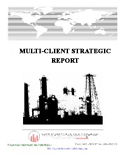Subscriber Login | About Us | Contact
HYDROCARBON PUBLISHING COMPANY
Translating Knowledge into Profitability®
A member of the Hydrocarbon Analytics Group
STORE
FUTURE ROLES OF FCC AND HYDROPROCESSING UNITS IN MODERN REFINERIES
Publication date:March 2009
Item#: C00901
Report answers the ultimate question of how to allocate resources in future operations based on feed availability, product values, operating costs, financial capability, and carbon footprint.
In-depth and insightful analyses of technology advances and economic assessments of solutions to (1) secure steady supplies of ultra-clean transportation fuels; (2) increase the use of heavy crudes and feedstocks derived from biomass, algae lipids, vegetable oils, and animal fats; (3) reduce emissions of greenhouse gases; and (4) raise productivity and improve energy efficiency in fluid catalytic cracking (FCC), hydrotreating, and hydrocracking units in the future
Since the onset of the global economic crisis and Obama Administration in the US calling for CO2 emission cap and increasing use of biofuels, many refiners in developed countries have anticipated the worse will come. In July, financial consultancy Deloitte issued a study, entitled called "A Tsunami of Change Bearing Down on Refining Industry" to warn that the fortune of US refiners has turned sour because of mandated higher vehicle standards, increased biofuel blending, and waste of investment in heavy oil processing due to carbon footprint concerns. The coming years will be tough and there is a sea change in the US refining industry.
For refiners around the world, changes and challenges are constant, from the record-high crude prices of mid-2008 to the marked demand destruction seen since late 2008. Once the global economies recover from the downturn, the demand for oil and refined products will pick up as in the previous business cycles. However, refiners will confront a relatively new environment. The impending challenges created by recent market and regulatory changes could dictate the ultimate fate of a company's refining business.
A fundamental question is, "Will a refiner still be in business in the next ten years?" The next decade represents a watershed era that will bring about a drastic shift in the refining industry. Current demand destruction is a temporary threat in comparison to the uncertainties and potentially earnings-damaging environmental mandates and market erosion of the future. Refiners must act now by reconfiguring their plant operations, especially the three primary processes FCC, hydrotreating, and hydrocracking in order to remain profitable and to survive twin profit margin threats. In the first scenario, revenues will take a blow due to biofuels mandates and weak product demand as the world takes time to emerge from the economic crisis. In the second, environmental and regulatory compliance expenses for ultra-clean fuels production, carbon cap and trade, and CO2 emissions reduction are beginning to pile up.
This 1600+ page Report will answer the ultimate question of how to allocate resources in future operations based on feed availability, product values, operating costs, financial capability, and carbon footprint. We present well-defined strategies as benchmarking tools to allow refiners and supplier companies to turn urgent concerns over the supply of ultra-clean fuels and climate change into business opportunities.
View prospectus for a detailed scope of topics covered in this Report.
Pricing Information
| Individual Use | Multiple Users/Library/Site license | |||
| Subscription Type | Electronic version | Print version | Others | Contact for pricing [email protected] +1-610-408-0117 |
| Pricing (US $) | $14,750 | $9,750, S&H incl. | ||
- All subscribers receive two print copy of the Report
- Receive the Report in PDF format, in addition to print version, at an additional cost of US$5,000.00 (US$8,750+$5,000)
- At the time of order, additional print copies of Report available at US$500.00 per copy. After initial order, extra copies will be charged at US$750.00 per copy plus shipping and handling costs
- Multiple-copy discounts are available. Please contact us for specific terms.
This Report is sold for the exclusive use of the subscribing companies and their employees. No other use duplications, storage in a retrieval system, transcriptions in any form or in any language or by any means of this Report or any part contained therein is permitted without written consent from Hydrocarbon Publishing Company, P.O. Box 661, Southeastern PA 19399 (USA).
Keywords: biofuels, biomass, bitumen, bottom of the barrel (BOB), extra heavy oil, fluid catalytic cracking or FCC, high acid crudes, hydrocracking and hydrotreating handbook, oil sands, opportunity crudes , report on refinery or refining units, resid


